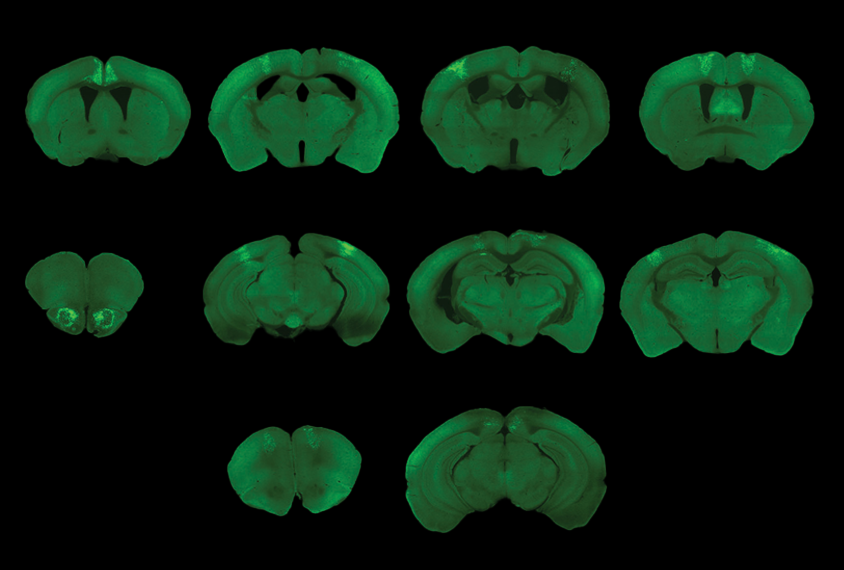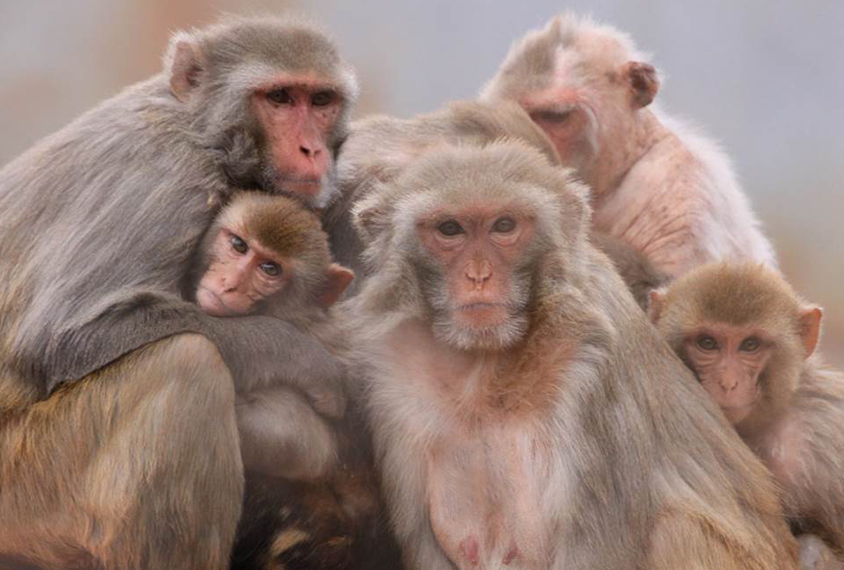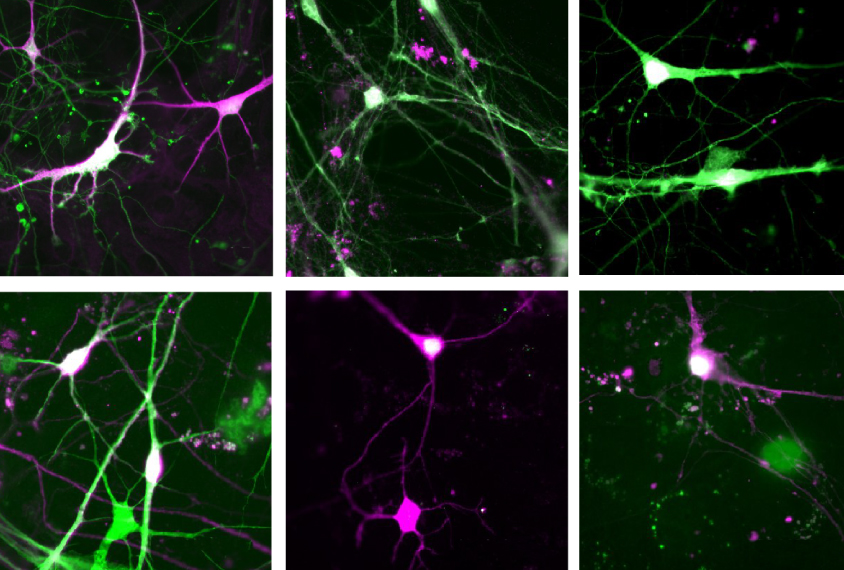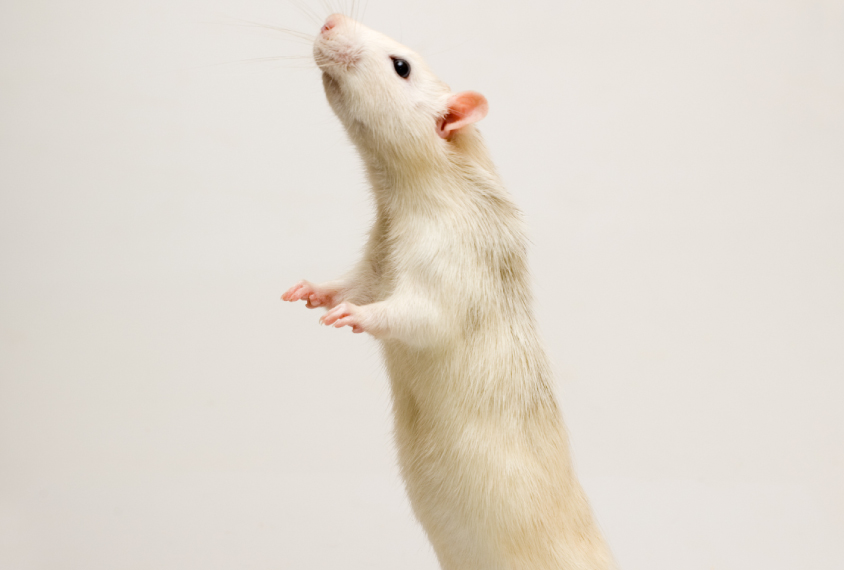SHANK2
Recent articles
Double SHANK knockout highlights brain circuit’s social role
Mice missing the autism-linked SHANK2 and SHANK3 genes in their retrosplenial cortex have trouble distinguishing between novel and familiar mice.

Double SHANK knockout highlights brain circuit’s social role
Mice missing the autism-linked SHANK2 and SHANK3 genes in their retrosplenial cortex have trouble distinguishing between novel and familiar mice.
Macaques’ social skills tied to variation in autism-linked genes
Genetics strongly influences some aspects of the monkey’s social behavior, including tendencies to solicit grooming and sit or play alone.

Macaques’ social skills tied to variation in autism-linked genes
Genetics strongly influences some aspects of the monkey’s social behavior, including tendencies to solicit grooming and sit or play alone.
How microscopic ‘condensates’ in cells might contribute to autism
A controversial idea about how cells compartmentalize their contents into droplets — like beads of oil in water — could be key to understanding autism, says Julie Forman-Kay.

How microscopic ‘condensates’ in cells might contribute to autism
A controversial idea about how cells compartmentalize their contents into droplets — like beads of oil in water — could be key to understanding autism, says Julie Forman-Kay.
Mechanical tracker measures social activity of multiple mice for days
A new system enables researchers to automatically track the social behavior of up to four mice for days at a time.
Mechanical tracker measures social activity of multiple mice for days
A new system enables researchers to automatically track the social behavior of up to four mice for days at a time.
New method creates uniform cultures of lab-grown neurons
A new technique leads to neuron cultures of consistent quality, enabling scientists to study how autism mutations alter neurons.

New method creates uniform cultures of lab-grown neurons
A new technique leads to neuron cultures of consistent quality, enabling scientists to study how autism mutations alter neurons.
Rats with mutant SHANK genes show autism-like behaviors
Researchers have engineered two new rats with mutations in a family of genes that function at neuronal junctions, they reported today at the 2014 International Meeting for Autism Research in Atlanta.

Rats with mutant SHANK genes show autism-like behaviors
Researchers have engineered two new rats with mutations in a family of genes that function at neuronal junctions, they reported today at the 2014 International Meeting for Autism Research in Atlanta.
Neighboring mutations in gene may spawn separate conditions
Two seemingly similar mutations in the SHANK3 gene have divergent effects on the brain and behavior.

Neighboring mutations in gene may spawn separate conditions
Two seemingly similar mutations in the SHANK3 gene have divergent effects on the brain and behavior.
Small snippets of genes may have big effects in autism
Small pieces of DNA within genes, dubbed ‘microexons,’ are abnormally regulated in people with autism, suggests a study of postmortem brains.

Small snippets of genes may have big effects in autism
Small pieces of DNA within genes, dubbed ‘microexons,’ are abnormally regulated in people with autism, suggests a study of postmortem brains.
Family of autism-linked proteins helps neurons communicate
The SHANK family of proteins, some of which are strong autism candidates, work together to facilitate brain signaling, according to unpublished results presented yesterday at the 2014 Society for Neuroscience annual meeting in Washington, D.C.

Family of autism-linked proteins helps neurons communicate
The SHANK family of proteins, some of which are strong autism candidates, work together to facilitate brain signaling, according to unpublished results presented yesterday at the 2014 Society for Neuroscience annual meeting in Washington, D.C.
SHANK3 mutations turn up in high proportion of autism cases
About 2 percent of people who have both autism and intellectual disability carry harmful mutations in SHANK3, a protein that helps organize the connections between neurons, according to a study published 4 September in PLoS Genetics.

SHANK3 mutations turn up in high proportion of autism cases
About 2 percent of people who have both autism and intellectual disability carry harmful mutations in SHANK3, a protein that helps organize the connections between neurons, according to a study published 4 September in PLoS Genetics.
Explore more from The Transmitter
PTEN problems underscore autism connection to excess brain fluid
Damaging variants in the autism-linked gene cause congenital hydrocephalus—a buildup of cerebrospinal fluid in the brain—by turbocharging a downstream signaling pathway that promotes the growth of cells, according to a new study.

PTEN problems underscore autism connection to excess brain fluid
Damaging variants in the autism-linked gene cause congenital hydrocephalus—a buildup of cerebrospinal fluid in the brain—by turbocharging a downstream signaling pathway that promotes the growth of cells, according to a new study.
U.S. health agency purge includes 10 lab heads at National Institute of Neurological Disorders and Stroke
The reasons for selecting these researchers—who have led work on neuronal migration, dopamine receptors in neuronal signaling and the structure of ion channels, among other areas—remain unclear.

U.S. health agency purge includes 10 lab heads at National Institute of Neurological Disorders and Stroke
The reasons for selecting these researchers—who have led work on neuronal migration, dopamine receptors in neuronal signaling and the structure of ion channels, among other areas—remain unclear.
Five things to know if your federal grant is terminated
If you want to appeal the decision, know the rules that govern terminations, as well as the specific rationale given in your notice, science policy experts say.

Five things to know if your federal grant is terminated
If you want to appeal the decision, know the rules that govern terminations, as well as the specific rationale given in your notice, science policy experts say.